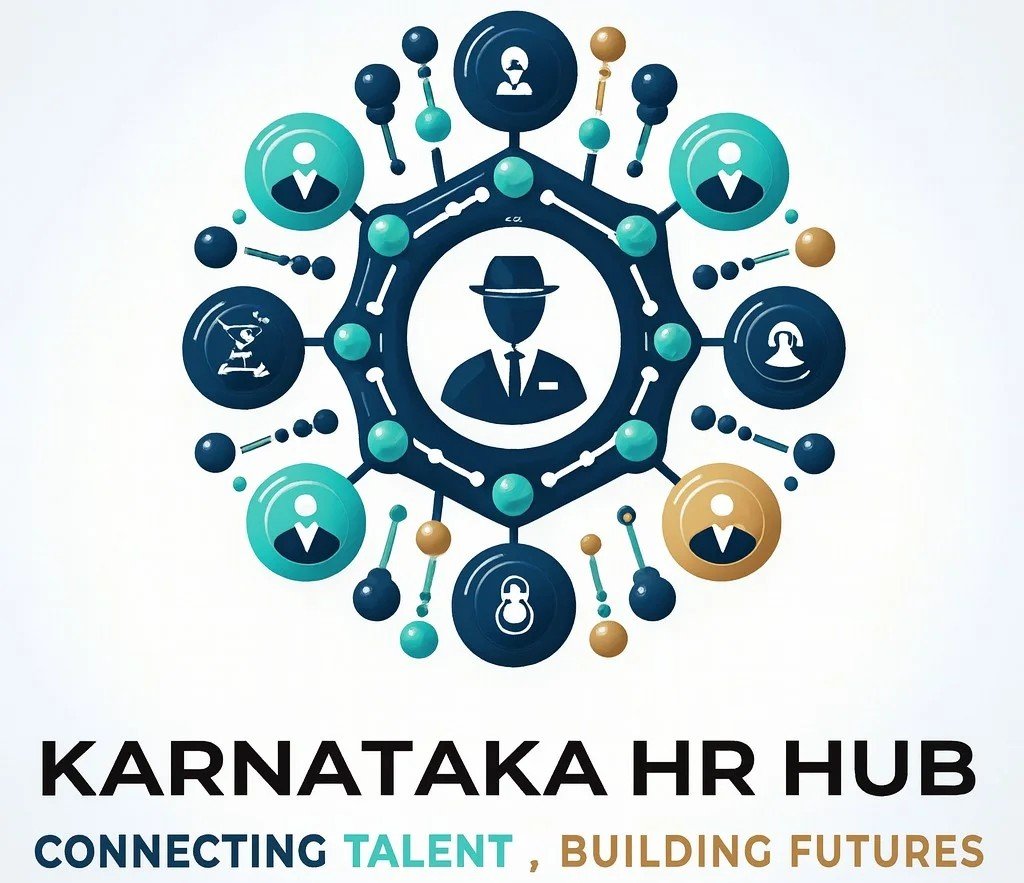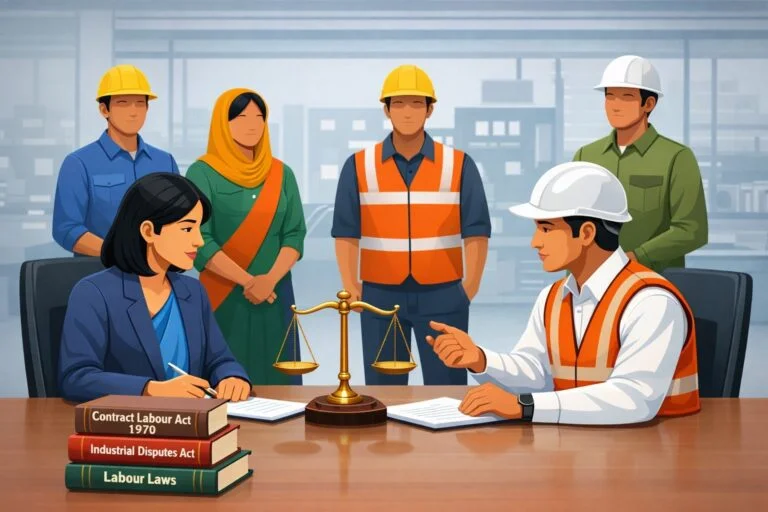Table of Contents
ToggleCan AI Replace HR Managers in India? A Human-Centric View.

Can AI Replace HR Managers in India? Exploring the Future of Human Resource Leadership
Introduction: Can AI Replace HR Managers in India?
“Can AI replace HR managers in India?” This question is being asked in boardrooms, HR meetings, and professional discussions across the country.
A few years ago, I was having coffee with a young HR executive from Bengaluru. Her phone kept buzzing with notifications — new job applications, employee queries, and team conflicts. She sighed and asked, “Sir, if AI keeps doing all this faster than us, will we even be needed?”
After twenty years in the HR field — from Chennai’s IT parks to Delhi’s manufacturing units — I’ve seen technology evolve at an incredible speed. Artificial Intelligence (AI) has made hiring faster, payroll simpler, and analytics smarter. Yet, one truth remains: AI can support HR, but it cannot replace the human heart behind it.
India’s workplaces are emotional, diverse, and people-driven. Managing people here requires empathy, judgment, and cultural understanding — qualities that no algorithm can fully replicate.
Read:20 Essential ChatGPT Prompts for HR
Why HR Managers Remain the Heart of India’s Workforce
In India, HR managers play a central role in maintaining balance across multi-generational, multilingual, and culturally diverse teams. They are not just administrators; they are counselors, mediators, and culture-builders.
The Many Roles of an Indian HR Manager
A typical HR manager in India handles a wide range of responsibilities:
Hiring and onboarding talent for roles across industries.
Managing employee morale and engagement.
Ensuring compliance with complex labor laws like the Factories Act, Shops and Establishment Act, and ESI regulations.
Aligning people strategies with organizational goals and growth plans.
Each of these functions demands judgment, empathy, and the ability to interpret human behavior — areas where AI tools still fall short.
The Human Edge in Diversity
India’s workforce is defined by its cultural and linguistic diversity. In 2019, I mediated a dispute between a Tamil-speaking engineer and a Hindi-speaking manager in a manufacturing plant near Bengaluru. Their conflict arose not from poor performance but from communication barriers.
Through one-on-one discussions in their preferred languages, we rebuilt trust and understanding. AI can analyze communication data, but it cannot sense emotion or restore trust between people. That’s why HR managers remain vital in India’s complex workplace environment.
Read Also: HR Analytics in India: Tools, Trends & Insights for Talent Strategy
Which HR Roles Are Most at Risk from AI in India?
To understand whether AI can replace HR managers in India, we must examine which HR roles are most affected by automation.
Roles AI Is Transforming or Replacing
AI is highly effective at handling repetitive and data-heavy processes. The most impacted roles include:
Recruitment Coordinators: AI-based tools like HirePro and Naukri RMS can screen thousands of resumes within minutes.
Payroll Specialists: Platforms like Keka and GreytHR automate salary processing, PF, and tax compliance.
HR Analysts: Dashboards now generate real-time analytics, eliminating hours of manual report preparation.
A 2024 People Matters study found that 45 percent of Indian companies already use AI for recruitment. The trend will continue to grow, especially in large organizations and tech-driven startups.
Roles That Will Evolve, Not Disappear
While some HR functions may shrink, others will evolve into more strategic roles:
Talent Acquisition Managers will focus on employer branding and candidate experience.
Compliance Officers will interpret changing labor laws with AI assistance.
HR Business Partners will combine analytics with people management to improve workforce strategy.
AI will not eliminate HR jobs in India; it will redefine them.
Recommended Read: Top 15 HR Metrics in India for 2025
AI in HR India: A Powerful Ally, Not a Replacement
The question “Can AI replace HR managers in India?” is often asked with fear. The better question is: How can AI help HR professionals do their jobs more effectively?
Where AI in HR India Performs Best
AI tools are excellent for structured and repetitive work. For instance:
Resume Screening: A Mumbai startup I consulted implemented AI-based screening and reduced hiring time by 35 percent.
Chatbots for Employee Queries: Infosys uses its chatbot Mika to answer up to 60 percent of employee questions related to leave, benefits, and payroll.
Payroll and Attendance: Tools like Keka automatically manage payroll and statutory compliance, reducing human error.
Where HR Managers Must Stay in Control
AI improves efficiency, but it cannot make ethical or emotional decisions.
In recruitment, AI can detect bias in job descriptions, but HR ensures fair selection.
In engagement analytics, AI may predict who is likely to leave, but HR develops real retention strategies through mentorship and culture programs.
AI should be viewed as a partner, not a replacement.
Read Also: Streamlining HR with ChatGPT: A Practical Guide for Professionals
Why Emotional Intelligence Beats Artificial Intelligence
When it comes to human relationships, AI simply cannot replace the depth of emotional understanding required in HR management.
Conflict Resolution Requires Empathy
In 2021, an employee in a Delhi startup was flagged by an AI tool as “disengaged.” But after a personal discussion, I discovered she was struggling with mental stress caused by workload and remote communication issues. A supportive HR conversation helped her recover her motivation and stay with the company.
Empathy, patience, and listening — these are not algorithmic skills.
Trust and Ethical Judgment
AI can recommend promotions or layoffs based on data, but it cannot weigh the moral or human side of those decisions. HR professionals must often make tough choices that require compassion, fairness, and understanding of individual circumstances.
Union and Liaison Challenges
In manufacturing and service sectors, HR teams often work with trade unions and government departments. These interactions depend on trust, negotiation, and legal interpretation — areas where only human understanding works effectively.
Read: Top 12 HR Trends in India 2025: Shaping Workplace Culture
Ethical Challenges of AI in HR India
While AI brings efficiency, it also carries ethical challenges that HR professionals must handle responsibly.
Language and Regional Bias
During an AI tool audit in 2020 for a Bengaluru firm, we found that the system preferred English resumes and ignored strong Kannada-speaking candidates from Tier-2 cities. Once retrained with diverse datasets, the bias reduced significantly. This shows why human oversight remains crucial.
Gender and Socioeconomic Bias
A 2022 Harvard Business Review study found that AI tools can penalize career breaks, indirectly affecting women returning from maternity leave. In India, this is particularly concerning since many professionals resume work after family responsibilities.
The Trust Deficit
According to a 2024 Gallup India survey, 72 percent of employees still prefer human feedback over algorithm-based reviews. When feedback feels robotic, employees lose motivation and connection to their work.
Best Practices for Using AI in HR India Responsibly
To ensure fairness and transparency, HR departments must adopt responsible AI usage practices.
Audit AI Systems Regularly: Check for language, gender, or regional bias at least once every quarter.
Train HR Teams in AI Awareness: Educate your team to identify when AI recommendations seem biased or incomplete.
Include Regional and Local Data: Ensure your datasets include resumes and profiles from smaller towns and regional languages.
Maintain Human Oversight: Final hiring or promotion decisions must remain human, even when AI provides inputs.
AI improves efficiency, but ethics depend on people.
Read: Actionable Strategies for Tech-Driven HR Growth in 2025
Real-Life Case Studies: How Indian Companies Use AI in HR
Case Study 1: TCS and Predictive HR Analytics
TCS uses an AI platform called Ignio to predict employee attrition. HR managers then act on this insight by offering training or flexible work options. This hybrid approach helped TCS reduce attrition by 15 percent in 2023.
Case Study 2: Unilever’s Hybrid Hiring Model
Unilever India uses AI-based assessments for preliminary candidate screening but ensures that final interviews are human-led to maintain fairness and cultural fit.
Case Study 3: Delhi EdTech Startup
A Delhi-based EdTech startup automated interview scheduling using AI in 2022. It saved nearly 20 hours weekly. The HR team used this saved time to organize wellness and motivation programs, improving morale by 30 percent.
These examples prove that the future of HR lies in collaboration, not competition, between humans and AI.
Read: AI Recruitment Tools India 2025: Practical Guide
Future Outlook: How HR Managers in India Can Thrive with AI
According to a 2025 NASSCOM report, India will face a 1.5 million tech talent shortage by 2026. This means HR professionals must embrace technology quickly to remain competitive.
1. Upskill in AI and Analytics
HR managers must understand data analytics, AI tools, and predictive dashboards. In 2023, I trained a Pune HR team on predictive analytics. Within six months, their hiring cycle time reduced by 25 percent.
2. Strengthen Human Skills
A 2024 SHRM India study revealed that 68 percent of employees prefer to stay in organizations that promote empathy and human connection. Strengthen your communication, counseling, and leadership abilities.
3. Stay Ethical and Transparent
Employees trust HR when they know how AI tools are used. Always explain the logic behind AI-driven hiring or performance evaluation to maintain transparency.
Top 5 AI Tools for HR Managers in India
| Tool | Function | Key Benefit |
|---|---|---|
| HirePro | Recruitment automation | Fast resume screening and candidate ranking |
| Keka | Payroll and compliance | Simplifies salary processing and statutory filings |
| Glint | Engagement analytics | Predicts employee turnover |
| Zoho People | HR operations | Centralized HR data management |
| CultureAmp | Inclusion and feedback | Measures team sentiment and culture |
These tools enhance efficiency while allowing HR professionals to focus on people-centered work.
Mini Case Study: The Factory HR and the AI Error
In 2024, a factory in Karnataka installed an AI-based attendance system. Soon, it began flagging several employees as “habitual absentees.” After investigation, the HR manager discovered the issue was caused by a malfunctioning biometric machine, not actual absenteeism.
Without human review, loyal employees could have been unfairly penalized. This case reinforces why human verification must always accompany AI systems.
Quick FAQs on AI in HR India
Can AI replace HR managers in India?
No. AI cannot replicate empathy, cultural understanding, or ethical decision-making.
Which HR tasks can AI automate?
Resume screening, payroll processing, attendance, and answering basic employee questions.
Will HR professionals lose jobs?
Some repetitive roles may reduce, but strategic and people-focused HR roles will expand.
How can HR professionals adapt to AI?
By learning analytics, using AI responsibly, and building strong interpersonal skills.
Conclusion: Can AI Replace HR Managers in India? Not Entirely
AI has already become an important part of HR management in India. A 2024 People Matters survey reported that nearly 45 percent of organizations use AI in some HR functions.
However, while AI can speed up processes, it cannot build trust, handle emotions, or make ethical choices. HR is not just about efficiency — it is about understanding people, resolving conflicts, and nurturing workplace culture.
AI can read data but not emotions.
AI can process resumes but not assess potential.
AI can calculate performance but not inspire loyalty.
The final answer is clear: AI cannot replace HR managers in India. It can only assist them.
The future of HR will belong to professionals who combine technology with emotional intelligence, empathy, and ethics. Use AI to save time — but lead with your heart. That’s what will define the next generation of HR leadership in India.


